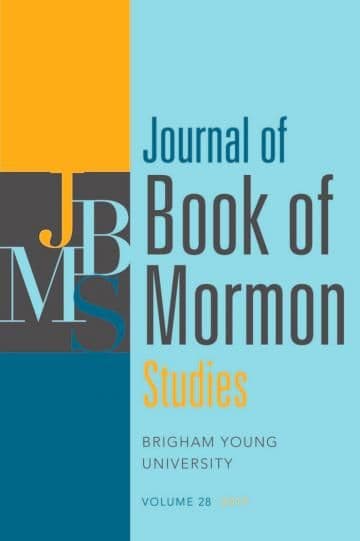Journal
Notes and Communications: "His Stewardship Was Fulfilled"

Title
Notes and Communications: "His Stewardship Was Fulfilled"
Publication Type
Journal Article
Year of Publication
1996
Authors
Tvedtnes, John A. (Primary)
Journal
Journal of Book of Mormon Studies
Pagination
169-170
Volume
5
Issue
2
Abstract
The Lord preserves his prophets until they have delivered their messages; examples include Abinadi from the Book of Mormon, Jeremiah in 4 Baruch, and Jesus in the New Testament.
Notes and Communications:
"His Stewardship Was Fulfilled"
John A. Tvedtnes
When Abinadi testified before King Noah and his priests, they “attempted to lay their hands on him” (Mosiah 13:2), but he warned them, “Touch me not, for God shall smite you if ye lay your hands upon me, for I have not delivered the message which the Lord sent me to deliver” (Mosiah 13:3). Knowing that “the Spirit of the Lord was upon him,” “the people of king Noah durst not lay their hands on him” (Mosiah 13:5), and Abinadi went on to tell them about the coming of the Messiah. “I finish my message,” he declared, “and then it matters not whither I go, if it so be that I am saved” (Mosiah 13:9). Only after he had delivered the words of the Lord were they able to slay him (Mosiah 17:1).
A similar story is found in the pseudepigraphic book known as 4 Baruch or “The Things Omitted from Jeremiah the Prophet.”1 “And as Jeremiah was saying these things about the Son of God, that he is coming into the world, the people became angry and said, “These (once) again are the words spoken by Isaiah the son of Amos, saying, “I saw God and the son of God.” Come, therefore, and let us not kill him by that (same) death [as Isaiah], but let’s stone him with stones'” (4 Baruch 9:21–22).2 But Jeremiah declared, “they will not kill me until I have described to you everything that I saw” (4 Baruch 9:24). He then asked the Lord to protect him, and his life was spared by divine intervention when the Lord blinded their eyes and made them think that a large stone was Jeremiah. “Jeremiah delivered all the mysteries that he had seen . . . and then he simply stood in the midst of the people, desiring to bring his stewardship to an end” (4 Baruch 9:29). The people then “saw him, [and] they immediately ran at him with many stones, and his stewardship was fulfilled” (4 Baruch 9:31).
On several occasions, as Jesus testified of himself and his relationship with the Father, those who heard him sought to slay him. On two of these occasions, he simply went “through the midst of them” and escaped unharmed (Luke 4:30; cf. John 8:58–59). On two other occasions, we read that “no man laid hands on him, because his hour was not yet come” (John 7:30; 8:20; cf. John 2:4; 7:6, 8). Only when he had completed his mortal ministry did he declare that “the hour is come; [and] the Son of man is betrayed into the hands of sinners” (Mark 14:41; cf. John 12:23; 13:1; 17:1).
These accounts from the New Testament, the Book of Mormon, and 4 Baruch illustrate the principle taught by Brigham Young in October 1844: “The Lord never let a prophet fall on the earth until he had accomplished his work.”3
Notes
- The text used herein is the English translation by S. E. Robinson, published in The Old Testament Pseudepigrapha, ed. James H. Charlesworth (Garden City: Doubleday, 1985), 2:418–25.
- Similarly, when Lehi told the people about his vision “of the coming of the Messiah, and also the redemption of the world . . . the Jews . . . were angry with him; yea, even as with the prophets of old, whom they had cast out, and stoned, and slain; and they also sought his life, that they might take it away” (1 Nephi 1:19–20; cf. Helaman 8:22). The Lord saved Lehi by telling him to flee Jerusalem. In this, Lehi’s story resembles that of Abinadi in Mosiah 11:26. When Nephi was threatened by his brothers, the Lord protected him as he protected Abinadi, by making it impossible for them to lay their hands on him until he had finished speaking (1 Nephi 17:48–55; cf. Lehi in 1 Nephi 2:13–14).
- HC 7:302.
Subject Keywords
Bibliographic Citation
Terms of use
Items in the BMC Archive are made publicly available for non-commercial, private use. Inclusion within the BMC Archive does not imply endorsement. Items do not represent the official views of The Church of Jesus Christ of Latter-day Saints or of Book of Mormon Central.